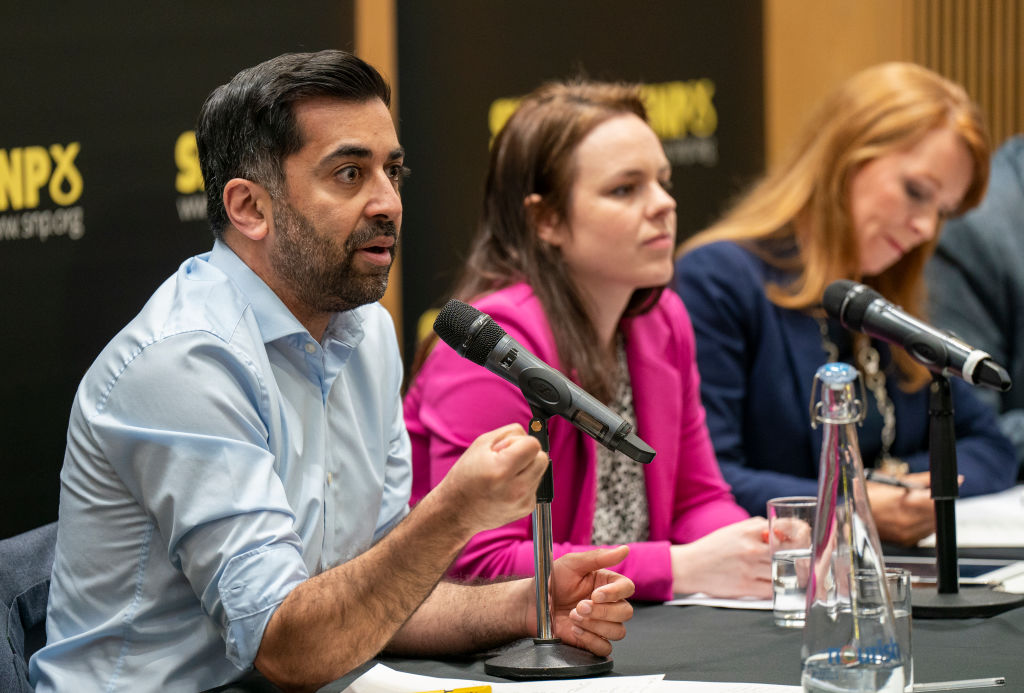Voting for the next SNP leader has begun. But who will emerge as the winner is far from clear. Nearly all of the polling to date has been of the general public. Among them, Kate Forbes, Scotland’s finance secretary – whose candidacy got into hot water when she revealed she would have voted against the introduction of gay marriage if she had been an MSP in 2014 – is clearly ahead. In four polls conducted over the last week, including two after a rancorous televised debate, she has on average secured 30 per cent support when voters were asked who they would like as their next First Minister.
That puts Forbes well ahead of Humza Yousaf, the current health secretary, who has secured the backing of most SNP MPs and MSPs and who is running at 20 per cent support; it also means she is beating Ash Regan, a former Scottish government junior minister who resigned over the controversial Gender Recognition Bill, who is on 10 per cent.
However, it is not voters in general who will decide the outcome. It will be SNP members. The best clue as to what they might think lies in the views expressed to pollsters by those who have previously voted for the SNP.
Here the race looks much tighter. Among those who voted for the SNP in the last Scottish Parliament election two years ago and who express a preference in the leadership contest, on average 42 per cent have said they back Yousaf. This puts him neck and neck with Forbes on 41 per cent. Both are placed well ahead of Regan on 18 per cent. Meanwhile, even among the party faithful, at least one in three have yet to make up their mind.
Ms Forbes’ problem is clear. Her lead among Scots rests on her relative popularity among those who do not back the party she seeks to lead.
The difference between the views of SNP voters (who are not all SNP members) and those of Scots in general is also extremely apparent when people have been asked to evaluate the candidates individually.
Among voters as a whole, Forbes has more admirers than critics, giving her an average net evaluation score in the polls of +3. In contrast, at -12, Yousaf’s average net score is in negative territory among the wider Scottish public. However, while Forbes has an average net score of +16 among SNP voters, Yousaf has a slightly better tally of +21.
Recent polls have evaluated the opinions of SNP members, SNP voters and the general public who usually vote for other parties. The one SNP member poll showed that party member views are more similar to those of SNP voters than they are to the wider public, many of whom vote for other parties. The members may even be yet more favourable to Yousaf as shown by this one poll. Conducted by Savanta, it put him on 31 per cent, Forbes on 25 per cent, Regan on 11 per cent. However, the sample was relatively small (just over 500) and the poll is now a fortnight old. But importantly as many as 32 per cent had not made up their minds.
So we cannot be sure whether the health secretary remains the stronger candidate among members compared with SNP voters. Even if he is, it might not be enough to carry him over the winning line.
The ballot is being held using preferential voting; if no candidate gets more than half of the vote, those cast for the least popular candidate (most likely Regan) will be redistributed according to their second preferences.
Only one poll, from Survation, has asked people their second preference. Among SNP voters who back Regan, this poll suggests Forbes is more popular than Yousaf, but inevitably there were relatively few such voters in the poll.
In any event, Forbes’ problem is clear. Her lead among Scots rests on her relative popularity among those who do not back the party she seeks to lead. In that she finds herself in much the same position as Rishi Sunak in his battle last year with Liz Truss for the Tory leadership, a battle he decisively lost. In the event Sunak got a second chance, but it seems unlikely that history would repeat itself if Forbes were to be defeated.
Yet Yousaf’s campaign is nothing like as strong as might be expected given his success in garnering the support of most SNP MPs at Westminster and MSPs at Holyrood, including the backing of John Swinney, former party leader and outgoing Deputy First Minister. Despite these endorsements, even among SNP voters he is apparently only neck and neck with a candidate whose fitness for the job many leading SNP figures have questioned.
It looks as though SNP politicians are not as in touch with the views of those who vote for them as they might like to think, let alone the opinions of Scotland in general.






Comments